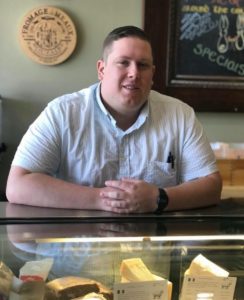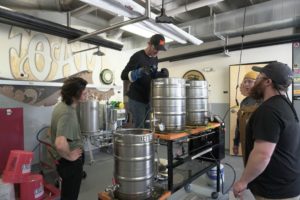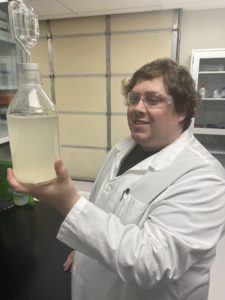 Dan Gusmer (B.S., ’20) could have followed a straight path to college and the family manufacturing business. But his creative energy led him to web design and culinary arts before his passion for fermentation brought him back into the multi-generational venture. And he needed the Colorado State University Fermentation Science and Technology Program in the Department of Food Science and Human Nutrition to bring the pieces together.
Dan Gusmer (B.S., ’20) could have followed a straight path to college and the family manufacturing business. But his creative energy led him to web design and culinary arts before his passion for fermentation brought him back into the multi-generational venture. And he needed the Colorado State University Fermentation Science and Technology Program in the Department of Food Science and Human Nutrition to bring the pieces together.
Growing up in Green Bay, Wisconsin, Gusmer enjoyed the problem-solving and creativity in web development. After graduating high school in 2007, he opted to pursue the career full-time, foregoing college. The Great Recession challenged the stability of this path, and he found a new creative outlet and career stability in restaurant kitchens, where he learned to cook.
Educational spark
When he was ready to double-down on his culinary skills, he went all-in by enrolling at the prestigious Culinary Institute of America in St. Helena, Calif. in 2015. While at the Culinary Institute, Gusmer connected with the Clif Family Winery (the sister company of Clif Bar). He became fascinated by the winemaking industry and the fermentation process, both of which are influenced by the products engineered and manufactured by his family’s business, Gusmer Enterprises.
Having found a personal connection between his passion and his family lineage, he was inspired to pursue a four-year degree that linked them. He researched several fermentation programs, and selected CSU because its Fermentation Science and Technology Program offered a comprehensive background in hard sciences. Housed in the Department of Food Science and Human Nutrition, the relatively new major teaches the ancient art of fermentation through a modern lens, which applies not only to food and beverage production, but also to human health through the gut microbiome.
The sweet spot
Fermentation, brewing, and winemaking are truly interdisciplinary, science-based crafts. The FST Program at CSU combines microbiology, organic chemistry, and engineering with the flavor, creativity, and fun Gusmer had found in culinary arts. The integration appealed to Gusmer, as did the array of industry connections that helped the CSU program stand out. CSU’s FST program works closely with industry partners to enhance the quality of its student experience, research, and outreach. Gusmer also took note that several faculty members and instructors in the FST program had a wealth of industry experience.
 In 2017, Gusmer left the Culinary Institute and headed east to Fort Collins where he enrolled at CSU as a fermentation science and technology major. While a first-year student, Gusmer became the inaugural recipient of the Sitzman Family Barley to Beer Scholarship. “This scholarship made me believe I was on the right path,” he said.
In 2017, Gusmer left the Culinary Institute and headed east to Fort Collins where he enrolled at CSU as a fermentation science and technology major. While a first-year student, Gusmer became the inaugural recipient of the Sitzman Family Barley to Beer Scholarship. “This scholarship made me believe I was on the right path,” he said.
As a non-traditional student, Gusmer was in good company in the FST program. “We are proud to attract many people looking to change or grow in their careers, as well as veterans and second bachelor’s students,” explained Jeff Callaway, associate director of the FST Program.
Gusmer spent the next few years developing muscle memory for the entire brewing process, starting with the Brewing Processes course. To this day, “The process feels like riding a bike,” he noted, appreciating how the many individual steps now integrate into a familiar routine. This allows the creativity to return: slight changes in procedures or ingredients can yield interesting new flavors.
Instrumental mentors
Jeff Biegert — a New Belgium Brewing-sponsored CSU instructor and brewmaster with the FST Program– was an instrumental teacher. Gusmer explained, “Biegert loves what he does, and he cares passionately about teaching. My favorite thing about his approach was that he gave his students opportunities to make mistakes but then he would help us problem-solve and troubleshoot together.”
Outside of the FST courses, Jeff Miller from CSU’s Hospitality Management program was another instrumental mentor to Gusmer. Miller’s mentorship and connections helped Gusmer finely tune his future career goals and hone his networking skills.
Propagating passions
 When thinking back on his time in the FST program, Gusmer remains grateful for all the hands-on learning experiences. In addition to the coursework, he completed an independent study working in the Gifford labs. For his senior project, he and three other FST students explored zinc bioaccumulation on multiple generations of yeast with the New Belgium QA Lab. This senior project fomented Gusmer’s budding interest in both yeast propagation and standard operating procedures for lab instrumentation – again, at the intersection of science, engineering, and creativity.
When thinking back on his time in the FST program, Gusmer remains grateful for all the hands-on learning experiences. In addition to the coursework, he completed an independent study working in the Gifford labs. For his senior project, he and three other FST students explored zinc bioaccumulation on multiple generations of yeast with the New Belgium QA Lab. This senior project fomented Gusmer’s budding interest in both yeast propagation and standard operating procedures for lab instrumentation – again, at the intersection of science, engineering, and creativity.
In the summer of 2020, Gusmer was offered a paid internship at Calluna Vineyards winery in California that allowed him to live on-site and be a part of the harvesting season, fulfilling a dream to see the winemaking process from the field to bottle. The opportunity was so appealing that Gusmer accelerated his graduation plans to spring 2020.
Returning to roots with his own twist
Today, Gusmer remains in northern California where he applies his personal passions and the skills and knowledge he gained at CSU to his family’s business. In the newly constructed Gusmer Fermentation Center in Santa Rosa, Gusmer serves as the Microbiologist in the Fermentation Development Group, which is focused on product development. He maintains his interest in yeast health – and his gratitude for all of the hard science foundational courses that the FST program required. “The interdisciplinary studies and experience come into play at my job every single day,” he remarked.
Initially launched in 1918 by his great-grandfather, Henry Gusmer, Gusmer Enterprises, Inc. began manufacturing and distributing products to the brewing market. The firm now has a global presence with expertise and contracts in the beverage, food, and the pharmaceutical industries. Using his CSU degree, Gusmer is helping the company branch out into new beverages, food fermentation, and alternative proteins such as plant-based meats.
Alumni advice
 Gusmer remains very connected to CSU and the FST program, and hopes to support student learning as a mentor and industry partner. For example, he is working with current FST seniors on a Gusmer Enterprises-sponsored hard seltzer yeast nutrient project. “It’s important for students to be as well-rounded as possible and the best way to do that is through hands-on experiential learning. Companies need to share real-world problems with students so they can come into the industry with relevant experience. It’s also important for students to get exposed to new ideas outside of traditional curricula.”
Gusmer remains very connected to CSU and the FST program, and hopes to support student learning as a mentor and industry partner. For example, he is working with current FST seniors on a Gusmer Enterprises-sponsored hard seltzer yeast nutrient project. “It’s important for students to be as well-rounded as possible and the best way to do that is through hands-on experiential learning. Companies need to share real-world problems with students so they can come into the industry with relevant experience. It’s also important for students to get exposed to new ideas outside of traditional curricula.”
Gusmer also has some sage advice for current FST students: “Do yourself a favor and pay attention in all of the classes, especially the ones that aren’t directly related to brewing,” he said. “The foundational hard science courses are essential and will give you the baseline knowledge your need be successful out in industry.”
His other tip – take advantage of interdisciplinary opportunities and hands-on, trial and error learning. “Get in as much lab time and lab experience as possible. If you know how to understand data, your career can and will excel quickly. If you’re really data minded, think about taking data science, statistics, or computer science courses in addition to FST.”
The Fermentation Science and Technology Program is a part of the Department of Food Science and Human Nutrition in CSU’s College of Health and Human Sciences.